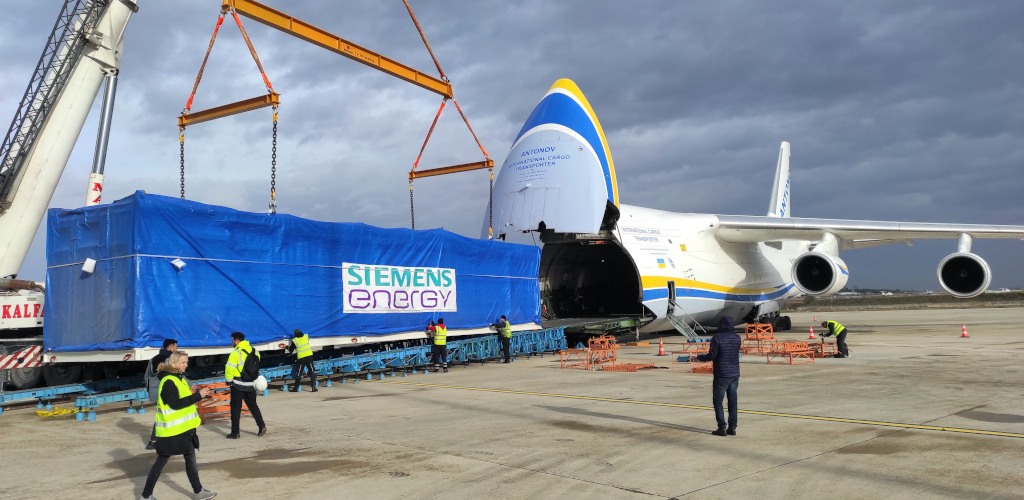May 06 | 2024
Ukraine War Rebuilding Must Wait but Project Cargo Remains Busy

By Breakbulk Staff
From Issue 3, 2024 of Breakbulk Magazine, project professionals from companies including Negabarit Service and Dealex Transport explain how they are overcoming the odds to ensure the shipment of urgently needed materials and equipment into and out of Ukraine.
(5-min read)
Forwarders and breakbulk specialists report a roaring trade in both imports and exports for Ukraine, despite Russia’s invasion more than two years ago. Breakbulk spoke to Oksana Antipa, a Ukrainian national who fled when the war started and has recently joined Synex Logistics Group. A former key account executive for DB Schenker in Kyiv, she is now based in Gdynia as Synex branch manager for Poland.
“Ukraine is a huge country and the war means there’s massive demand for a long list of materials,” Antipa says. “Buildings are being re-built, factories are still operating, agriculture continues, so there’s constant demand for raw materials.
“Life is going on, universities are working, children are going to school and people are trying to live a normal life. But the buses, trains and trams were ruined, so I get a lot of requests regarding this type of cargo, including brand new electric buses from China.”
In addition, Antipa says “huge volumes” of stainless steel rounds are being imported to Polish and Romanian ports, bound for Ukraine. Baltic Hub Container Terminal is a facility of choice for smaller shipments coming in on container vessels, while breakbulk ships usually call at Port Gdynia.
Ukraine’s exports, on the other hand, also remain strong, according to Antipa. These include more routine items such as grain, timber, lumber, honey, sunflower oil, fruit, vegetables and finished steel products, but also cargoes unique to Ukraine. “For example, Ukraine manufactures very interesting Sherp utility task vehicles that can be driven on the mountains and go in the water – they are very unusual and are in demand in the USA, in Canada and worldwide.”
Antipa adds: “Nevertheless our primary task at the moment is imports, helping to get all the materials needed into Ukraine. We are working closely with our partner Dealex Transport in Ukraine, we support each other and have built a very good setup. Ukrainian freight forwarding companies are now asking for help, because we have the warehouses, special rates, special contracts for freight, and knowledge of the Romanian and Polish ports.”
While Odessa port remains officially closed to maritime traffic, Antipa says a “special corridor for small breakbulk vessels” exists to facilitate the import of critical cargoes such as building materials and stainless steel. “After the war, enormous projects will naturally come – not only rebuilding of houses, but relocation of factories, electricity projects and there will be even greater demand for equipment."
Industry Recovery
Ongoing closure of Ukraine’s airspace means heavy-lift carrier Antonov Airlines is unable to carry out domestic operations, though it says it has “partially relocated” the airline to Germany, thanks to established relations with Leipzig/Halle airport.
 “There is also a base for operational work and aircraft maintenance,” says Dmytro Prosvirin, commercial director at Antonov.
“There is also a base for operational work and aircraft maintenance,” says Dmytro Prosvirin, commercial director at Antonov.“In this way, we are able to continue working on international air routes, meeting the demand in the market of extra-heavy and oversized cargo. Five aircraft of the An-124-100 type make flights all over the world, except for areas where flights are restricted for security reasons.
“Part of the flights are carried out in the interests of Ukraine while the remaining shipments are project cargo, including satellites, turbines, gas and oil production equipment and generators, general cargo and missions under the Nato Salis program.”
The carrier’s base at Gostomel airport on the outskirts of Kyiv suffered significant damage, though Prosvirin reports that repair works are underway. “Plans are being developed for the restoration and development of the airport after the end of hostilities in Ukraine,” he adds. Turkish engineering firm Mabtec, for instance, intends to build a logistics and transportation hub at Gostomel, once Ukraine’s airspace is operational again.
In general, Antonov sees a recovery of logistics activity following the Covid-19 pandemic, with particularly strong demand from the industrial and energy sectors. “It is worth noting the increased interest from companies in the aerospace industry over the past 20 years, and we predict a further increase in the number of orders in this industry,” concludes Prosvirin.
Motoring On
From his office in Kovel, a city in north-west Ukraine close to the Polish border, the owner of heavy transport company Negabarit Service tells Breakbulk that a wide-scale rebuilding effort is still a distant prospect.
“At the moment, Ukraine is maintaining its state more than rebuilding, especially considering the destruction of energy facilities, ports and infrastructure, houses and roads,” says Oleg Kozel. Notwithstanding the war, Negabarit is busy and has continued to invest in equipment. Established in 2002, the family firm has more than 150 trucks and more than 180 trailers in its fleet.
“Our company is involved in the delivery of construction equipment and energy equipment for infrastructure facilities,” Kozel explains. “We deliver a lot of different vehicles, including buses, trams, trolleybuses, trucks for cities, especially in frontline areas.
“Despite the difficult times and the war, several factories were also built in Ukraine, so we are involved in the transportation of equipment from the ports of Romania, Poland, Germany, and Belgium. Of course, we also transport a lot of humanitarian equipment to support cities and towns with critical infrastructure.”
Like many Ukrainian companies, Negabarit has been affected by personnel shortages. “Many workers went to war from the beginning of the invasion, including our logistics manager Ivan Trofimuk, who participated in the Breakbulk exhibition in 2021 in Bremen, as well as many drivers and other workers,” the company director says.
“Of course, it affects our work when professional people leave us for a while, but we encourage and support these people in every way. The risk that some of our employees will join the army is always present, but we are quite positive about it and are ready to adapt to such conditions. Despite all the risks, our company invested more than 12 million euros in new equipment during the war.”
Turning to future opportunities, when the war finally ends, Kozel says: “As everyone knows, our country did not have high-quality road infrastructure or bridges to begin with, so this will require significant updating. We should also not forget about green energy – we have a large country, so this is a promising direction.
“Even during the war, Ukraine was able to survive without Russian gas and oil and significantly develop the extraction of its minerals, therefore this market is also quite promising.”
Dealex Transport and Negabarit Service will be exhibiting at Breakbulk Europe 2024 on 21-23 May in Rotterdam.
TOP PHOTO: Antonov AN-124 loaded with cargo from Siemens Energy. CREDIT: Antonov
